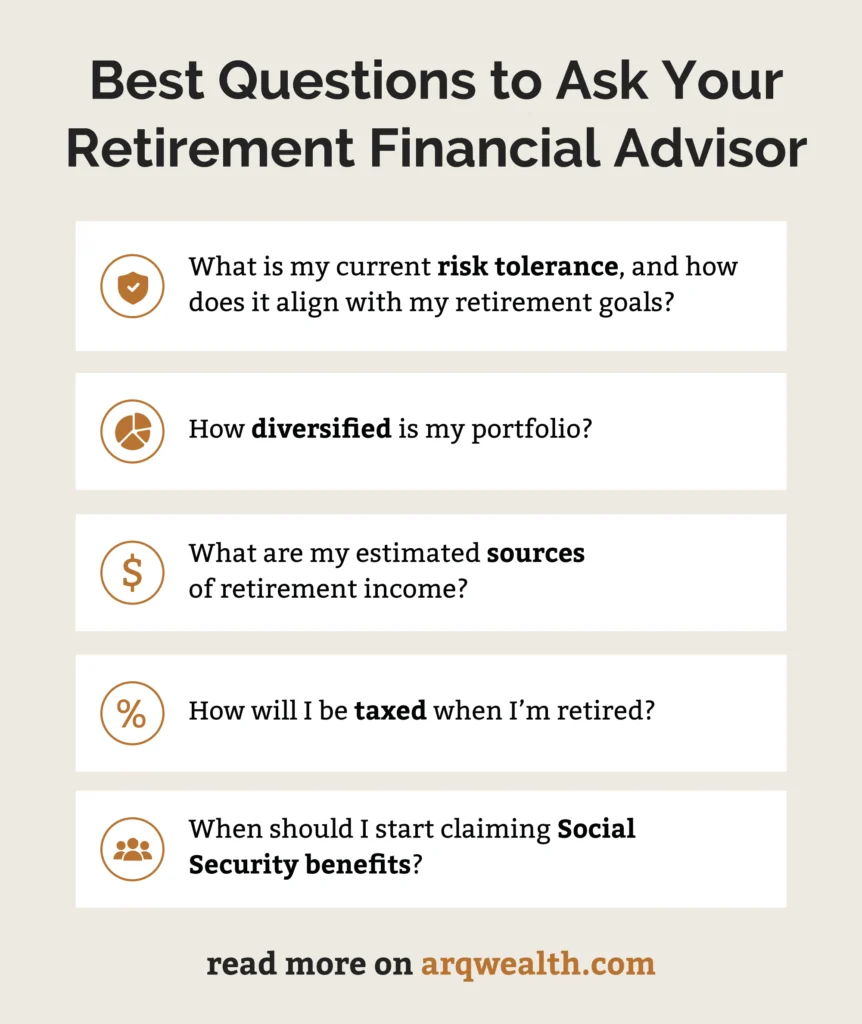Retirement, a time for freedom and self-discovery, can quickly become a financial minefield without proper planning. A trusted financial advisor is your navigator, ensuring a smooth and secure journey throughout your golden years. However, successful collaboration requires open communication.
Here’s a comprehensive guide to the essential questions you should ask your financial advisor at every stage of your retirement planning.
Pre-Retirement Questions

The years leading up to retirement are like charting a course for a long voyage. You need a well-defined plan, a sturdy vessel (your financial portfolio), and a clear understanding of potential risks.
The ARQ Wealth Wealth Builders program works with young professionals “along the voyage” to help plan for kids’ educational needs, future retirement needs, and preparing for the unexpected “alterations in course.”
Here are the crucial questions to ask your advisor during this critical phase:
What is my current risk tolerance, and how does it align with my retirement goals?
Your risk tolerance directly impacts your investment strategy. As you approach retirement, your advisor will assess your risk profile and adjust your retirement portfolio accordingly. This ensures you generate the necessary returns without taking on excessive risk.
As you get closer to retirement, your financial advisor may suggest shifting your investment portfolio towards more conservative investments with lower risk profiles but steadier returns.
How diversified is my portfolio?
Diversification is critical to mitigating risk. Your financial advisor can assess the current asset allocation of your retirement portfolio (stocks, bonds, and cash equivalents) and adjust it to ensure appropriate diversification as you near retirement. Like maintaining your car before a road trip, your retirement portfolio needs regular rebalancing.
Your advisor will ensure your asset allocation aligns with your financial goals, maximizing returns while mitigating risk.
What are my estimated sources of retirement income?
Understanding your projected income streams helps your financial advisor create a realistic retirement roadmap. It’s never too early to determine the optimal claiming strategy for your Social Security options.
How will I be taxed when I’m retired?
How you invest your retirement assets today will have significant tax implications in retirement. Your cash flow in retirement will depend, in part, on how much you pay in income taxes. Making certain adjustments to your investment portfolio now can significantly reduce your taxable income in retirement.
For example, when you invest in a traditional IRA or 401(k) with pre-tax dollars, you benefit from a current tax deduction and tax deferral on your earnings. However, your withdrawals are taxed as ordinary income. If you invest in a Roth IRA with after-tax dollars instead, you’ll still enjoy tax-favored earnings growth, but you will pay no income tax on your withdrawals.
Ask your financial advisor if converting all or a part of your traditional IRA to a Roth IRA makes sense.
When should I start claiming Social Security benefits?
The timing of claiming your Social Security benefits significantly impacts your monthly payout. Taking benefits before your full retirement age will reduce your monthly benefit while delaying benefits can increase it. Many retirees base their decision on when to claim Social Security benefits on several factors, including their health and financial situation.
Your advisor can analyze your financial situation and calculate the best age to maximize your Social Security benefits.
How much should I budget for healthcare expenses in retirement?
Medicare covers a significant portion of healthcare costs for retirees, but it doesn’t cover everything. You will need to factor in potential out-of-pocket expenses for medications, co-pays, and possible long-term care needs.
Do I need long-term care insurance?
About 70% of seniors will need some form of long-term care, either at home or at a nursing facility. With average nursing home costs nearing $70,000 annually, it’s essential to have a plan in place to cover those costs. Long-term care insurance can be a cost-effective way to cover expenses while protecting assets.
What legal documents do I need to have in place?
Proper estate planning ensures your wishes are carried out after you’re gone. This means setting up wills, trusts, and powers of attorney beforehand. Your financial advisor can work with an estate planning attorney to develop a plan that minimizes taxes and protects your assets for your family members.
Who should I designate as beneficiaries for my retirement accounts and life insurance policies?
Review and update your beneficiary designations regularly, reflecting any changes in your family situation and ensuring they are coordinated with your will.
Transitioning to Retirement
Many important questions to ask before retirement are also applicable in the transition and retirement phases.
The advisors at ARQ Wealth also support clients with retirement with the ARQ Wealth Apex service. They help clients decide when to take Social Security, provide referrals to discuss Medicare options and when to start, and run various financial scenarios to determine the best time for the client to retire and meet their financial needs.
Will my planned withdrawal rate maintain my lifestyle?
Market conditions and inflation can impact your purchasing power over time. For example, during a down market, you might need to sell more shares to provide the income you need. That share reduction can reduce the amount of income your portfolio can produce overall.
Is there a tax-efficient order for withdrawing funds from my various retirement accounts (IRA, 401(k))?
The order in which you tap into your retirement accounts can significantly influence your tax burden. Your financial advisor can develop a withdrawal strategy that minimizes your tax liability. You should also ask your financial advisor how
Can I comfortably maintain my desired lifestyle?
Ask your financial advisor to revisit your budget and spending habits, adjusting as needed to ensure your retirement income stream covers your living expenses. You might consider downsizing or reducing day-to-day costs to enjoy a better overall lifestyle.
Will I need part-time work or a side hustle?
If your retirement income falls short of your needs, explore options like part-time work or passive income streams to supplement your earnings. Today, many people continue to work at some level in retirement to stay busy and augment their retirement income. Your advisor can help analyze how this additional income will affect your withdrawal rate and potentially the taxation of your Social Security benefits.
Settled in Retirement
Even after you cross the retirement threshold, you should continue to revisit many of the questions asked in earlier phases concerning taxes, withdrawal strategies, and estate planning and make adjustments based on your evolving circumstances and market conditions. Here’s one more critical question that could impact your cash flow long term:
How should I manage my RMDs to minimize taxes?
Required Minimum Distributions (RMDs) are mandatory withdrawals from your retirement accounts starting at age 73, even if you don’t need the income. This will result in a higher tax liability. Your advisor can help you understand the RMD rules and develop strategies to minimize their tax impact.
Managing your retirement plans doesn’t have to be complex. Contact the experts at ARQ Wealth to learn how to safeguard your financial future and achieve your life goals.


